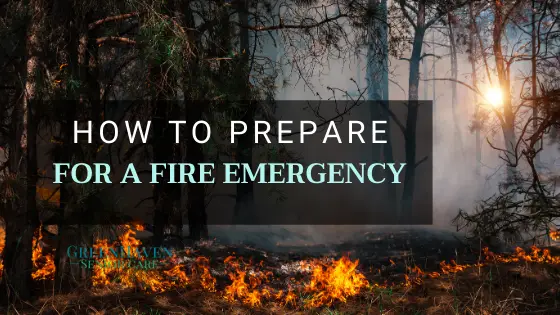
AI Companions for Seniors: A Thoughtful Guide for Families and Caregivers
AI companions for seniors explained by Greehaven Senior Care: what they are, how they help, and what families should consider before choosing one.

Unfortunately, fires happen when you expect them the least. Preparedness is a yearlong effort, but disasters don’t wait. Are you ready? Do you have a senior parent that you are worried about?
Take responsibility to protect your life! Prepare NOW for a sudden emergency
Emergencies and disasters can strike quickly and without warning and can force you to evacuate your neighborhood or be confined to your home. This year many areas here in the west are dealing with wildfires, fire emergencies, emergency evacuations, etc. What would you do if your basic services—water, gas, electricity, or communications— were cut off?
Fast-moving wildfires can be especially difficult for seniors to navigate safely. That’s why it’s important for older adults to be prepared ahead of time. Local officials and relief workers may not be able to reach everyone right away. You can deal with fire disasters better by preparing in advance and by working with those in your support network: your family, neighbors, and friends as a team.
Knowing what to do is your responsibility. Learn how to protect yourself and cope with disaster by planning ahead. Even if you have physical limitations, you can still protect and prepare yourself.
These are some suggestions that adult children and caregivers can use to create a safer environment with a solid emergency plan for a senior.
This includes your home, your yard, or anything physical you own. We have seen this year how stupid actions, negligence, and criminal activities have created huge wildfires that affect everybody’s life. Dry grass and dead vegetation act as fuel for these types of fires. You may lower the risk it will be consumed in a wildfire by taking precautions around a senior’s home and yard.
The National Fire Protection Association suggest the following tips in preparing your senior’s home for a fire emergency:
Click Here to download information about ignition-free zones around a senior’s home.
| Step 1: Pack an Emergency Kit | Create an emergency bag or suitcase your senior can quickly grab in the event of a fire. Every second counts when a wildfire approaches your home and requires evacuation. Things you should pack: • prescription medications, • copies of personal and legal documents, • a few small or favorite mementos. Keep your emergency kit in a spot easily and quickly accessible. You can even keep it in the trunk of your car. |
| Step 2: Establish Good Practices | Develop precautionary habits that will help you keep your senior safer in case of a home fire or a wildfire. Keep your glasses and hearing aids on the bedside table. Always have cell phones charged. If you have a senior adult that uses a wheelchair, walker, or cane, encourage them to keep it nearby. |
| Step 4: Buy an Emergency Radio | Emergency radios are your connection to the real world in any emergency situation. This is particularly important to haven in the event of a power outage. Whether it is a crank radio or a battery-operated one, there are a variety of options to choose from. Some emergency radios also accommodate cell phone charging. |
| Step 4: Plan the Evacuation Routes | You and the senior person(s) in your family must know the escape routes from every room in the house. Upstair rooms or homes on a higher elevation should be equipped with fire escape ladders that attach to windows. If you feel your loved one may have trouble climbing down a ladder, you should advise them to stay close to the ground floor. Once you established your routes, make sure you practice them over and over until they become routine. It is recommended to have at least two escape routes from the home, in case one is blocked. |
| Step 5: Create an Escape Plan From Your Neighborhood | Just like we mentioned above that you need two escape routes from your senior’s home, you should also create two separate ways to escape from the neighborhood. If one of them is blocked by a fire, your seniors won’t lose time trying to figure out what to do. When the evacuation order comes, it’s also important to know where a safe place to retreat is. Call the local fire department or safety services office to find out where the nearest shelters are located. See the table below |
Call 9-1-1 only to report a life-threatening situation requiring police, medical, or fire emergency assistance. Do not call 9-1-1 unnecessarily; lines must be kept open for people with true emergencies. Information you will need to know: Location, Phone Number, Type of emergency, and name of those involved.
Let friends and family know you’re safe.
People and animals that are seriously injured or burned should be transported to professional medical or veterinary help immediately.
Stay out of fire-damaged homes until local fire authorities say it is safe to re-enter.
“Emergency Radio” button_url=”https://amzn.to/3ijU2qT” link_option_url=”https://amzn.to/3ijU2qT”]
Emergency Solar Hand Crank Portable Radio, NOAA Weather Radio for Household and Outdoor Emergency with AM/FM, LED Flashlight, Reading Lamp, 2000mAh Power Bank USB Charger and SOS Alarm
Emergency Zone 4 Person Urban Survival 72-Hour Bug Out/Go Bag | Perfect Way to Prepare Your Family | Be Ready for Disasters Like Hurricanes, Earthquake, Wildfire, Floods
Adams County: 509-659-3337
Algona: 253-833-2743
Asotin County: 509-243-2088
Auburn: 253-876-1925
Bellevue: 425-452-6813
Bellingham: 360-778-8440
Benton County: 509-628-2600
Black Diamond: 360-886-5700
Bothell: 425-806-6242
Buckley: 360-829-1441
Bucoda: 360-278-3345
Centralia: 360-330-7680
Chelan County: 509-667-6863
Cheney: 509-498-9291
Clallam County: 360-417-2544
Clark County: 360-696-4461
Clyde Hill: 425-453-7800
Columbia County: 509-382-3928
Cowlitz County: 360-577-3130
Douglas County: 509-884-0941
Ellensburg: 509-933-7231
Everett: 425-257-8109
Federal Way: 523-835-2701
Ferry County: 1-800-342-4344
Fife: 253-896-8241
Franklin County: 509-545-3546
Garfield County: 509-843-3494
Gig Harbor: 253-853-2420
Grand Coulee: 509-633-1105
Grant County: 509-237-2598
Grays Harbor County: 360-249-3911
Island County: 360-679-9567
Issaquah: 425-837-3470
Jefferson County: 360-385-9368
Kent: 253-886-4440
King County:206-296-3830
Kirkland: 425-587-3650
Kitsap County:360-307-5871
Kittitas County: 509-962-7525
Klickitat County: 509-773-0582
Lacey: 360-459-4333
Lake Forest Park: 206-957-2850
Lakewood: 253-983-7853
Lewis County: 360-740-1151
Lincoln County: 509-725-9263
Maple Valley: 425-413-8800
Mason County: 360-427-7535
Medina: 360-490-3542
Mercer Island: 206-275-7610
Monroe: 360-863-4540
Normandy Park: 206-248-7600
North Bend: 425-888-0486 x 1
Okanogan County: 509-429-2576
Olympia: 360-753-8348
Pacific County: 360-875-9340
Pend Oreille County: 509-447-3151
Pierce County: 253-798-6595
Port Angeles: 360-417-4655
Pullman: 209-334-0802
Puyallup: 253-864-4170
Redmond: 425-556-2500
Renton: 425-430-7000
San Juan County: 360-370-7612
Sea-Tac: 206-973-4500
Seattle: 206-233-5076
Shelton: 360-426-3348
Shoreline: 206-801-2271
Skagit County: 360-416-1850
Skamania County: 509-427-8076
Skykomish: 360-677-2686
Snohomish County: 425-388-5060
Snoqualmie: 425-888-5911
Spokane County: 509-477-2204
Stevens County: 509-684-5296
Sumner: 253-299-5644
Tacoma: 253-591-5798
Thurston County: 360-867-2800
Tukwila: 206-575-4404
Tumwater: 360-754-4170
Vancouver: 360-892-4323
Wahkiakum County: 360-795-3242
Walla Walla County: 509-524-2900
Wenatchee: 509-664-3950
Whatcom County: 360-676-6681
Whitman County: 509-397-5606
Woodinville: 425-877-2281
Yakima County: 509-574-1900
Yelm: 360-458-5701
Chehalis Tribe: 360-273-5911
Chinook Indian Nation: 360-875-6670
Colville Tribe: 509-634-2468
Cowlitz Tribe: 360-577-7432
Duwamish Tribe: 206-431-1582
Hoh Tribe: 360-374-6549
Jamestown S’Klallam Tribe: 360-683-1109
Kalispel Tribe: 509-999-7066
Lower Elwha Klallam Tribe: 360-452-6252 x 7656
Lummi Nation Tribe: 360-312-2000
Makah Tribe: 360-645-2201
Muckleshoot Tribe: 253-261-4724
Nez Perce Tribe: 208-343-2253 x 3760
Nisqually Tribe: 360-489-9250
Nooksack Indian Tribe: 360-592-5176
Port Gamble S-Klallam Tribe: 360-297-2646
Puyallup Tribe: 253-627-8368
Quileute Nation Tribe: 360-374-0920
Samish Indian Nation: 360-293-6404
Sammamish Tribe: 425-392-6256
Sauk-Suiattle Indian: Tribe 360-436-0131
Shoalwater Bay Tribe: 360-267-8120
Skokomish Tribe: 360-426-4441
Snoqualmie Indian Tribe: 428-888-6551
Spokane Tribe: 509-315-6612
Squaxin Island Tribe: 360-463-0903
Steilacoom Tribe: 253-584-6308
Stillaguamish Tribe: 360-474-9111 x 107
Suquamish Tribe: 360-598-3311
Swinomish Tribe: 360-466-7244
Tulalip Tribe: 360-716-5945
Upper Skagit Tribe: 360-854-7000
Yakama Nation: Tribe 509-865-5121
Call (206) 801-7555 Or Contact Us for Room Availability, Pricing, or if you are a family member or friend of our residents.

AI companions for seniors explained by Greehaven Senior Care: what they are, how they help, and what families should consider before choosing one.

Call (206) 801-7555 Or Contact Us for Room Availability, Pricing, or if you are a family member or friend of our residents. Dementia is a

Dementia is a challenging condition for both individuals and their families. Learn about dementia, its impact, and why Greenhaven Senior Care in Edmonds is the best choice for compassionate and personalized dementia care

Discover the best senior-friendly activities in Edmonds, WA! From scenic waterfront strolls and cultural events to top dining spots like Arnies and Epulo Bistro, explore engaging ways to stay active and social. Whether you enjoy art classes, farmers markets, or a relaxing ferry ride, Edmonds offers something for everyone. Read on for our top recommendations!